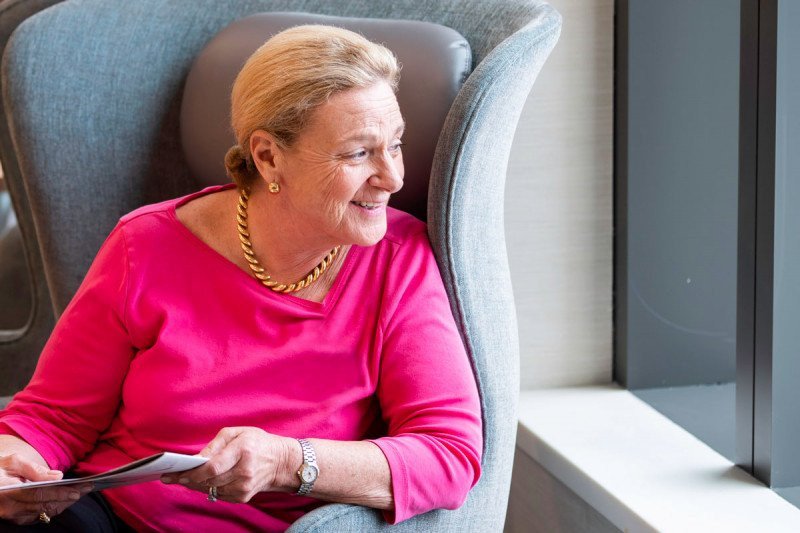
Just a few months ago, the phrase “social distancing” was not a part of our everyday vocabulary. But now, distancing from others to stay safe is the new normal and these restrictions have left many feeling isolated or lonely.
Even before the pandemic, approximately one-quarter of people age 65 years and older were socially isolated and more than 40 percent of people age 60 years and older reported feeling lonely. Of course, older adults are a diverse group of individuals and not everyone feels this way. However, it is important to understand that having these emotions right now is valid and common.
Taking active steps to stay connected and relaxed is important. A recent study of 515 U.S. adults aged 20-79 found that older adults who were proactive about managing their anxiety due to COVID-19 reported less stress. Fortunately, there are ways to stay connected during this time that are safe and don’t require extensive knowledge of technology.
Kelly Trevino, PhD, codirector of Psycho-Oncology of Aging and Cancer (PAC MSK) laboratory at Memorial Sloan Kettering (MSK), suggests that “a good first step is to have a clear understanding of your COVID-19 risk based on your age, current health, and co-morbid conditions. You can discuss this with your primary care physician or oncologist who can also give you recommendations for how to minimize your risk based on your individual health and situation. A second step is to think about what is meaningful and important to you and be creative regarding ways to integrate this meaning into your life.”
A few more tips from Dr. Trevino on how to manage feelings of isolation and loneliness include:
Power of the Telephone
You don’t need elaborate technology to stay connected. Simply speaking to someone on the telephone and hearing their voice is better than being alone. Dr. Trevino encourages older adults to feel empowered to call their younger family members. Everyone is desiring more connections right now, so it’s a great opportunity to reach out to those you don’t typically speak with on the phone.
Find Ways to Engage in Your Favorite Activities
Think about hobbies or pastimes you enjoyed before the pandemic and consider how you can modify these activities to be safer during this time. It is better for your mental health to participate in a modified way than not at all. For example, many people who enjoy walking with their friends and family are now unable to due to social distancing measures. In lieu of walking in a group, set up a friendly competition with your walking buddies where you walk laps by yourself, track your steps and see who can log the most steps. Or, if you previously enjoyed getting together for coffee with friends before, coordinate a time every morning to call your friends or family to catch up while sipping a cup of coffee at home.
…Or Start a New Activity
You don’t have to learn a complex new skill or complete a task that has been on your to-do list to stay active. Instead, think about ways to expand on activities you already enjoy. For example, if you enjoy listening to music, buy a xylophone or a harmonica and learn to play a few songs. If you enjoy cooking, buy a new cookbook in a cuisine you don’t normally try and make some of the recipes. Another strategy is to contact local organizations, such as community centers or public libraries, to learn about available resources and socially distanced and remote events you might enjoy. Many organizations have found creative ways to offer their services that are consistent with COVID-19 restrictions.
Get Outdoors (Safely)
Outdoor activities that include physical distancing are recommended over indoor activities. If approved by your oncologist, you can still get together with loved ones from a distance. For example, set up lawn chairs in your driveway six feet apart, wear masks, and visit with family or neighbors. Many people have been doing “drive-bys” where they drive past family and friends’ homes and wave and say hello. These activities are certainly not as effective for many as hugs and shared meals but are better than remaining alone. It is vital to schedule frequent activities to break up the week and maximize your interactions with others.
Limit “Bad” News
Be wary of what media you’re consuming every day and how much you are consuming. While it is tempting to leave the news on all day, the constant barrage of negativity can be overwhelming. Take breaks from watching, reading, and listening to the news, including social media. If you enjoy having the TV on during the day, find channels that make you feel better. For example, there are many movie and cooking channels that include programming that is more upbeat and predictable. Additionally, replacing the television with music or audio books can be a less stressful way to relax.
Click here to find more ways to manage stress and anxiety due to COVID-19.
